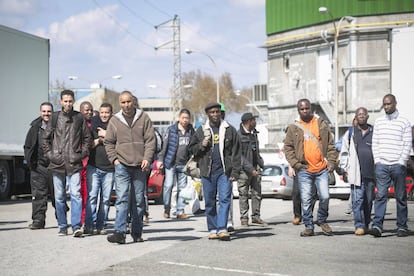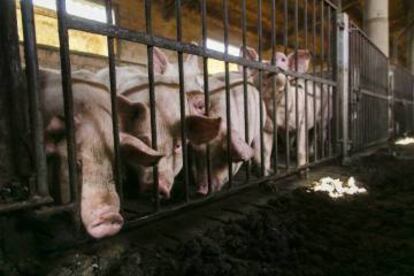Life on the killing floors of Catalonia
Labor dispute at abattoirs exposes dangerous working conditions imposed on immigrant workforce

You get five seconds per pig. First you rip out the offal, which weighs around 20 kilograms. Then you cut around the lungs and pull them out. After that, you have to slice out the tongue and then hang what’s left of the animal on a butcher’s hook.
Do this 10 times in rapid succession and your arms start to tingle. After that, they begin to go numb; eventually, your nails turn black and fall out. When you’re working at a rate of 700 carcasses an hour, the repetitive nature of the work means you can’t move your shoulders at the end of the day.
You have to be both fit and desperate for this job, like Emmanuel Kumi, who left his family behind in Ghana to make the journey by foot to Morocco
You have to be both fit and desperate for this job, like Emmanuel Kumi, 47, who left his family behind in the West African nation of Ghana to make the journey by foot to Morocco, where he caught a patera – one of the rickety boats that bring illegal immigrants to Spain’s shores.
In 2005, he found work at Esfosa, one of the biggest slaughterhouses in Vic, an industrial town in Catalonia, and where the majority of employees are also immigrants. Like Emmanuel, they come from all over the world in search of a better life; some by patera like Emmanuel, others jumping the border fence at the Spanish exclave of Melilla. Among them are Romanians and Poles and Chinese such as Xiao Pin and, in recent years, there has been an influx of Indians, like Surjit Singh.
Rampant racism, long hours and inhuman treatment of workers who fall ill or are injured in an accident are among the grievances cited by the men who agreed to talk to El PAÍS about their two-day strike in early April, the first such challenge to the Catalan meat industry by its immigrant workforce.
It didn’t do them much good. Instead of being invited to the negotiating table, John Bosco, one of Emmanuel’s co-workers from Senegal, was both insulted and threatened by his boss, Josep Ramisa.
According to witnesses, Ramisa, one of the so-called “aristobutchers” of the Catalan pork sector and a partner in the Esfosa company, called Bosco “a black piece of shit!” and threatened to send him “back to Africa, where you’ll die of hunger!” Julio Risque, a co-worker of Bosco’s, claims Ramisa also threatened the strikers and to “pump them full of bullets.”
Ramisa, who is facing charges of intimidation and who already has a criminal record for breaching environmental legislation, refused to talk to EL PAÍS.

The dispute, which has been covered by local media such as 9 Nou and Nació Digital, is the tip of the iceberg in an industry plagued by social, labor and environment problems, all of which have been rife since the crisis triggered 20% growth in the meat industry.
Once a sector run by small family businesses, it is now in the hands of six or seven big corporations, most of which are Catalan. These conglomerates not only manage the abattoirs, they also run the farms, supply animal feed and take care of transport and distribution. Farmers no longer even own the pigs they feed and have now been “integrated” into a fully industrialized, vertical supply chain.
Local farmer Josep Maria Llopart says profit margins are slim. The raw materials for the feed come from the United States. The pigs are fattened, slaughtered and then exported. “We’re left with the slurry,” he says.
Few of the men working on the killing floors of Vic speak Spanish. They come to work on rundown bicycles from the poor neighborhoods on the outskirts of town. Most of those working at the Esfosa slaughterhouse are on permanent contracts, but other abattoirs such as Le Porc Gourmet, owned by Grupo Jorge in Santa Eugenia de Berga, workers can be hired and fired as needed.
The main problems are a lack of security and racism
Monsterrat Castañé, COS labor union
These contracts, introduced in Catalonia and now common across Spain, are known as cooperatives. Most workers employed on this basis earn €800 a month, with €50 deducted for belonging to the supposed cooperative, along with deductions for work materials, laundry, along with a €267 social security contribution. A no-union clause means men can be fired on the spot for no-reason and cannot claim compensation.
José Miguel Torrecilla, a spokesperson for Le Porc Gourmet, defends the use of cooperative contracts, arguing, “The price of pork is very volatile and there are times when we need more staff. This is the only way we can deal with the situation. We are not breaking the law.”
But such precarious labor conditions have provided criminal gangs with the opportunity to establish money-for-work rackets. “The bosses don’t realize but the supervisors are in on it,” says Said Belkacem, who was fired from Le Porc Gourmet in February for striking. “If you don’t pay them €500, you don’t get the job. There was a while when a Chinese woman working in the offal zone was selling jobs to the Chinese. There was also a guy from Ghana called Patrick who charged his fellow Ghanaians to work.”
Said also mentioned an Indian worker with criminal connections who was murdered at the gates of another big abattoir.
The Catalan meat sector says it has taken action to tackle the gangs exploiting its workforce. José Luis Tolosana, President of the Taic cooperative which works in association with abattoirs such as Le Porc Gourmet, says his organization received anonymous complaints two years ago, and in a bid “to stamp out this kind of behavior,” told workers to refuse to pay for jobs and go to the police if they were threatened. Since then, Tolosana claims he’s heard no more about it.
A criminal network had charged 300 Chinese workers up to €16,000 for a job, sums paid off by deducting quotas directly from their wages
But according to meat workers in Vic, it remains a problem in the sector. One case currently making its way through the courts in Vic is the result of an operation that targeted a network of people traffickers linked to Baucells, one of the biggest slaughterhouses in the area.
The network had charged 300 Chinese workers up to €16,000 for a job, sums paid off by deducting quotas directly from their wages. Six people, most of them Chinese, along with the Spanish personnel manager, were charged.
Meanwhile, the mayor of the nearby town of Santa Eugenia, Anna Franquesa, has taken up the migrant workers’ case. “There are people here working in sub-human conditions,” she says, adding: “We have gone to parliament about it and we are talking to trade unions, the government of Catalonia and Caritas [a Catholic Church charity]. The problem is that the abattoirs have the law on their side. The director of Le Porc Gourmet tells me it’s difficult to put workers on normal contracts because the company would suffer huge losses.”
Sign up for our newsletter!
EL PAÍS English Edition is launching a weekly newsletter. Sign up today to receive a selection of our best stories in your inbox every Saturday morning. For full details about how to subscribe, click here.
Montse Castañé of the COS labor union sits on Esfosa’s works council and has helped expose demeaning and hazardous conditions there. She told EL PAÍS that in the 11 years she’s spent working there, she’s never seen anything like the current conditions.
She accuses the company of refusing to call an ambulance when people have been injured on the production line, instead making them call a taxi, and cites the case of father of three Surjit Sing who had to walk home from the hospital at 4am after a serious accident.
“The main problems are safety and racism,” Castañé told El País. “The other day there was a guy from Ghana who was doubled over in pain and I asked the supervisor to have someone replace him. His reply was, ‘He’s black and he’s just arrived. Let him die’.”
English version by Heather Galloway.
Tu suscripción se está usando en otro dispositivo
¿Quieres añadir otro usuario a tu suscripción?
Si continúas leyendo en este dispositivo, no se podrá leer en el otro.
FlechaTu suscripción se está usando en otro dispositivo y solo puedes acceder a EL PAÍS desde un dispositivo a la vez.
Si quieres compartir tu cuenta, cambia tu suscripción a la modalidad Premium, así podrás añadir otro usuario. Cada uno accederá con su propia cuenta de email, lo que os permitirá personalizar vuestra experiencia en EL PAÍS.
¿Tienes una suscripción de empresa? Accede aquí para contratar más cuentas.
En el caso de no saber quién está usando tu cuenta, te recomendamos cambiar tu contraseña aquí.
Si decides continuar compartiendo tu cuenta, este mensaje se mostrará en tu dispositivo y en el de la otra persona que está usando tu cuenta de forma indefinida, afectando a tu experiencia de lectura. Puedes consultar aquí los términos y condiciones de la suscripción digital.









































